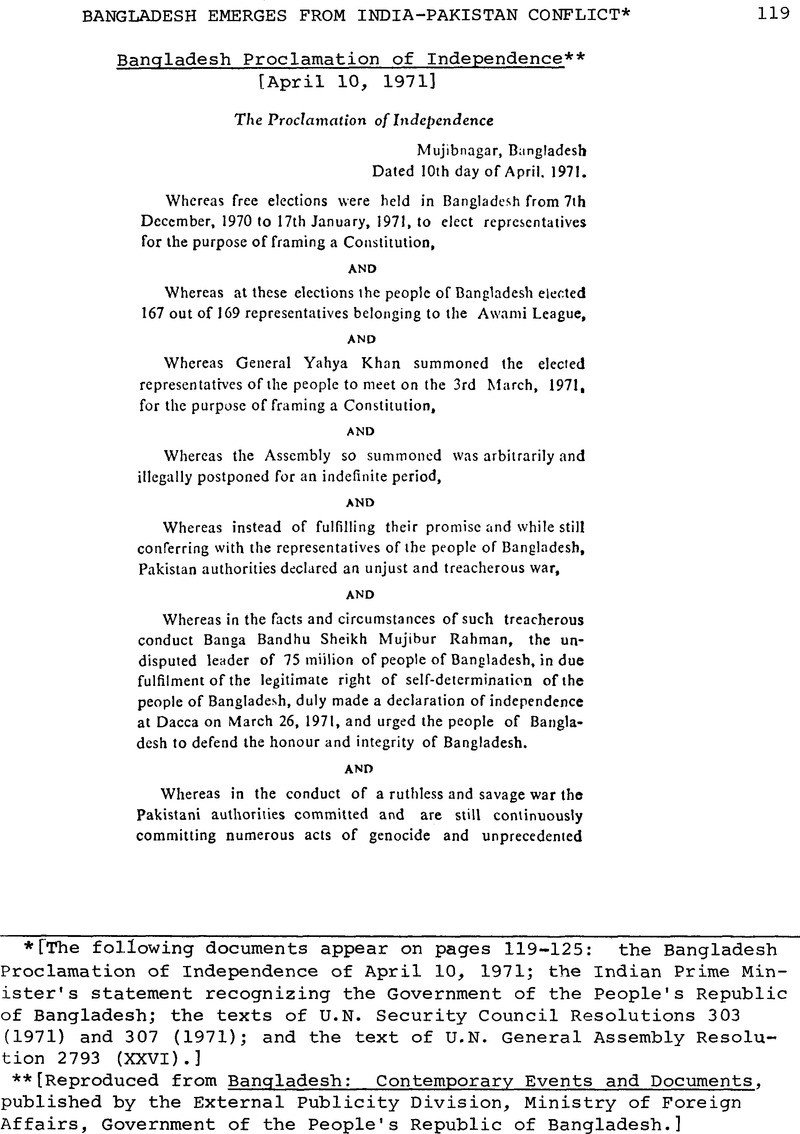No CrossRef data available.
Article contents
Bangladesh Emerges From India-Pakistan Conflict*
Published online by Cambridge University Press: 20 March 2017
Abstract

- Type
- Reports
- Information
- Copyright
- Copyright © American Society of International Law 1972
Footnotes
[The following documents appear on pages 119-125: the Bangladesh Proclamation of Independence of April 10, 1971; the Indian Prime Minister’s statement recognizing the Government of the People’s Republic of Bangladesh; the texts of U.N. Security Council Resolutions 303 (1971) and 307 (1971); and the text of U.N. General Assembly Resolution 2793 (XXVI).]
References
** [Reproduced from Bangladesh: Contemporary Events and Documents, published by the External Publicity Division, Ministry of Foreign Affairs, Government of the People’s Republic of Bangladesh.]
* [The text of the Prime Minister’s statement is reproduced from India News, Vol. X, No. 37 (December 10, 1971), issued by the Information Service of the Embassy of India at Washington, D.C.
[As of January 31, 1972, the following countries had granted recognition to Bangladesh: Australia, Austria, Barbados, Bhutan, Bulgaria, Burma, Cyprus, Czechoslovakia, German Democratic Republic, Hungary, Iceland, India, Khmer Republic, Mongolia, Nepal, New Zealand, Poland, Union of Soviet Socialist Republics and Yugoslavia.]
1 S/10410 and Add.1, S/10412.
* [Reproduced from U.N. Document S/RES/303 (1971) of December 6, 1971.
[On December 4, 1971, the Security Council met to consider the item “the recent deteriorating situation which has led to armed clashed between India and Pakistan”. A number of draft resolutions were considered by the Security Council on December 4 and 5, but none adopted. On December 6, the Council referred the question to the General Assembly under the “Uniting for Peace” resolution. Resolution 303 (1971) was adopted by a vote of 11 in favor to none against, with 4 abstentions (France, Poland, U.S.S.R., United Kingdom).]
** [Reproduced from U.N. Document A/RES/2793 (XXVI) of December 9, 1971.
[The resolution was adopted on December 7, 1971, by a vote of 104 in favor to 11 against (Bhutan, Bulgaria, Byelorussia, Cuba, Czechoslovakia, Hungary, India, Mongolia, Poland, Ukraine, U.S.S.R.), with 10 abstentions (Afghanistan, Chile, Denmark, France, Malawi, Nepal, Oman, Senegal, Singapore, United Kingdom).
2 A/8555.
3 General Assembly resolution 2734 (XXV) of 16 December 1970.
* [Reproduced from U.N. Document S/RES/307 (1971) of December 21, 1971.
[The resolution was adopted on December 21, 1971, by a vote of 13 in favor to none against, with 2 abstentions (Poland, U.S.S.R.).
[On December 16, 1971, an instrument of surrender was signed by the Pakistani and Indian commanders in East Pakistan in which “the Pakistani Eastern Command agree[d] to surrender all Pakistani armed forces in Bangladesh to Lieut. Gen. Jagjit Singh Aurora, general officer commanding in chief of the Indian and Bangladesh forces in the eastern theater”.]




